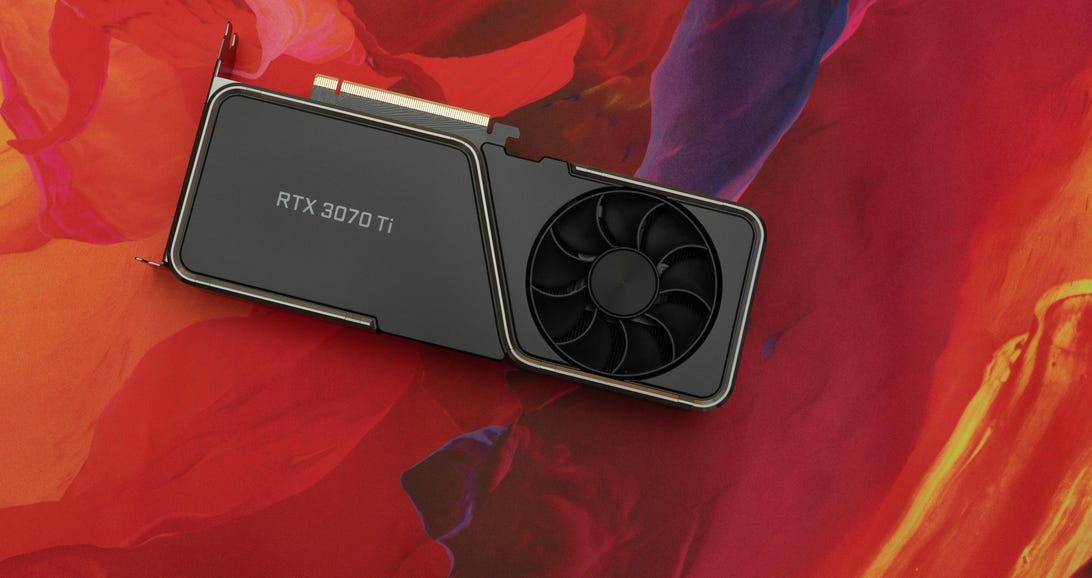
Nvidia's GeForce RTX 3070 Ti is literally the most middling GPU of the past year, and that's not necessarily a bad thing. On almost every gaming performance test I've run, the 3070 Ti delivered the median score in a field of RTX 3000 series and AMD Radeon RX 6000 series cards, more or less.
Nvidia positions the starting-price $599 (£529, AU$979) GPU, which excels at 1440p and entry 4K gaming, as the natural upgrade from the RTX 2070 Super. But if you're looking to save a little money (or potentially a lot, given the state of GPU supplies) even the cheaper RTX 3070 will give you a big performance lift over the previous generation under most conditions. You'll be able to buy it, in theory, starting June 10.
Read more: Nvidia GeForce RTX 3080 Ti and 3070 Ti stock checker
The design of the 3070 Ti is different from that of the 3070; it's about an inch longer and there's a fan on either side of the card, in contrast to the 3070, which has both fans on one side. It still vents out the back of the card. In fact, though it's about 0.5 inch shorter than the RTX 3080 and RTX 3080 Ti, the 3070 Ti bears the most resemblance to the 3080, with the exception of some cosmetics.
Nvidia GeForce RTX 3070 Ti
| Memory | 8GB GDDR6X |
|---|---|
| Memory bandwidth (GBps) | 608.06 |
| Memory clock (GHz) | 1.188 |
| GPU clock (GHz, base/boost) | 1.58/1.78 |
| Memory data rate/Interface | 19 Gbps/256 bit |
| RT cores | 48 |
| CUDA Cores | 6144 |
| Texture mapping units | 192 |
| Streaming multiprocessors | 48 |
| Tensor Cores | 192 |
| Process | 8nm |
| TGP/min PSU | 350W/750W |
| Max thermal (degrees C) | 199F/93C |
| Bus | PCIe 4.0x16 |
| Size | 2 slots; 7.94x4.3 in (202x110 mm) |
| Launch price | $599 |
| Launch date | June 10, 2021 |
On the inside, it has exactly 4.35% more of everything than the 3070: RT cores, CUDA Cores, texture mapping units, streaming multiprocessors and Tensor cores -- almost like the product was designed by an algorithm asking "What GPU can we sell at $599, midway between the RTX 3070 and 3080?" rather than to answer "What do gamers need now?" A bigger difference is the upgrade to higher-bandwidth (by about 30%) GDDR6X memory. The price you pay is a 16% increase over the RTX 3070 in power requirements, as well as the bigger size.
It delivers excellent 1440p performance, but there are very few situations in which it delivers a significant advantage -- in other words, worth the price premium -- over the cheaper RTX 3070 for gaming; it's typically around 6%-8% faster, with the occasional bump to about 10%. Similarly, AMD's competing Radeon RX 6800 delivers the same or slightly better performance in many games, as long as you don't care about the ray tracing, for a little less.
There were some cases, on Watch Dogs: Legion and Shadow of the Tomb Raider benchmarks in 1440p, for example, where my CPU bottlenecked frame rates occasionally in 1440p. It's an 8-core Core i7-10700K (not overclocked), though, which from a price/performance perspective should be an appropriate match for the RTX 3070 series. GPU performance can be extremely configuration dependent (although the synthetic benchmarks bore out the results), and all I can really say is that for my test configuration, it's no slam dunk.
But there are some notable exceptions. On 3DMark's Mesh Shaders test -- a new feature in DirectX 12 Ultimate that more efficiently, and therefore more quickly, handles rendering of complex geometry -- it was more than 1.5 times faster than the RTX 3070 and only a little slower than the RTX 3080 Ti, which means you should see at least some lift in frame rates once it's implemented. As far as I can tell, there aren't any PC games shipping now which support mesh shaders, and Unreal Engine 5, the next version of the popular game development platform and which should help broaden the use of mesh shaders, is still in early access.

The higher-bandwidth memory also gives it a boost on some creative applications, thanks to the higher-bandwidth memory, extra CUDA cores and more.
This is such a weird time to shop for a graphics card, especially midrange ones; chip production delays, combined with GPU-hungry cryptocurrency miners snapping up all available inventory and manufacturers and distributors jacking up prices to take advantage of the demand bubble, has turned buying a GPU into a boss battle of epic proportions.
Despite Nvidia's introduction of cryptomining-optimized cards (its CMP HX) and throttling the mining performance of gaming GPUs (now retronymmed LHR for low hash rate), things still don't look especially promising. The RTX 3080 Ti launched last week and it's already out of stock -- even Nvidia's own cards. Try buying a PS5 instead: you've got a better chance of snagging even that ludicrously hard-to-find console than a current GPU, especially at a reasonable price.
Performance test results
Far Cry 5 (4K)
MSI Aegis RS (RTX 3060)
MSI Aegis RS (RTX 3060 Ti)
MSI Aegis RS (6700 XT)
iBuyPower Element CL (RTX 3070)
MSI Aegis RS (RTX 3070 Ti)
MSI Aegis RS (6800)
Origin PC Chronos (RTX 3080)
MSI Aegis RS (6800 XT)
MSI Aegis RS (RTX 3080 Ti)
Note:
Longer bars indicate better performance (fps)Shadow of the Tomb Raider gaming test (1440p)
MSI Aegis RS (RTX 3060)
MSI Aegis RS (RTX 3060 Ti)
MSI Aegis RS (RTX 3070)
MSI Aegis RS (RTX 3070 Ti)
MSI Aegis RS (6800)
MSI Aegis RS (6700 XT)
MSI Aegis RS (RTX 3080 Ti)
Origin PC Chronos (RTX 3080)
MSI Aegis RS (6800 XT)
Note:
Longer bars indicate better performance (FPS)Shadow of the Tomb Raider gaming test (4K)
MSI Aegis RS (RTX 3060)
MSI Aegis RS (RTX 3060 Ti)
MSI Aegis RS (RTX 3070)
MSI Aegis RS (RTX 3070 Ti)
MSI Aegis RS (6700 XT)
MSI Aegis RS (6800)
MSI Aegis RS (6800 XT)
MSI Aegis RS (RTX 3070 Ti with DLSS)
MSI Aegis RS (RTX 3080 Ti)
Origin PC Chronos (RTX 3080)
Note:
Longer bars indicate better performance (FPS)3DMark Time Spy
MSI Aegis RS (RTX 3060)
MSI MEG Trident X (RTX 2070 Super)
MSI Aegis RS (RTX 3060 Ti)
MSI Aegis RS (6700 XT)
MSI Aegis RS (RTX 3070)
MSI Aegis RS (RTX 3070 Ti)
MSI Aegis RS (6800)
Maingear Turbo (RTX 2080 Ti)
MSI Aegis RS (6800 XT)
Origin PC Chronos (RTX 3080)
MSI Aegis RS (RTX 3080 Ti)
Note:
Longer bars indicate better performance3DMark Fire Strike Ultra
MSI Aegis RS (RTX 3060)
MSI MEG Trident X (RTX 2070 Super)
MSI Aegis RS (RTX 3060 Ti)
MSI Aegis RS (6700 XT)
Maingear Turbo (RTX 2080 Ti)
MSI Aegis RS (RTX 3070)
MSI Aegis RS (RTX 3070 Ti)
Origin PC Chronos (RTX 3080)
MSI Aegis RS (6800)
MSI Aegis RS (RTX 3080 Ti)
MSI Aegis RS (6800XT)
Note:
Longer bars indicate better performance3DMark Variable Rate Shading (4K)
MSI Aegis RS (RTX 3060)
MSI Aegis RS (3060 Ti)
MSI Aegis RS (6700 XT)
MSI Aegis RS (RTX 3070)
MSI Aegis RS (RTX 3070 Ti)
MSI Aegis RS (6800)
MSI Aegis RS (6800 XT)
Maingear Turbo (RTX 3080)
MSI Aegis RS (RTX 3080 Ti)
Note:
Longer bars indicate better performance (FPS)SpecViewPerf 2020 SolidWorks (4K)
MSI Aegis RS (RTX 3060)
MS Aegis RS (6700 XT)
MSI Aegis RS (6800)
MS Aegis RS (3060 Ti)
MSI Aegis RS (6800 XT)
MSI Aegis RS (RTX 3070)
MSI Aegis RS (RTX 3070 Ti)
Maingear Turbo (RTX 3080)
MSI Aegis RS (RTX 3080 Ti)
Note:
Longer bars indicate better performance (FPS)SpecViewPerf 2020 Medical (4K)
MSI Aegis RS (3060 Ti)
MSI Aegis RS (RTX 3070)
MSI Aegis RS (RTX 3070 Ti)
Maingear Turbo (RTX 3080)
MS Aegis RS (6700 XT)
MSI Aegis RS (RTX 3080 Ti)
MSI Aegis RS (6800)
MSI Aegis RS (6800 XT)
Note:
Longer bars indicate better performance (FPS)Test configurations
| Maingear Turbo (RTX 2080 Ti) | Microsoft Windows 10 Home (2004); 3.8GHz Ryzen 9 3900XT; 32GB DDR4 SDRAM 3,600; 11GB Nvidia GeForce RTX 2080 Ti; 1TB SSD + 4TB HDD |
|---|---|
| MSI Aegis RS (RTX 3060 Ti) | Microsoft Windows 10 Home (2004); 3.8GHz Intel Core i7-10700K; 16GB DDR4 SDRAM 3,000; 8GB Nvidia GeForce RTX 3060 Ti; 1TB SSD |
| MSI Aegis RS (RTX 3060) | Microsoft Windows 10 Home (2H20); 3.8GHz Intel Core i7-10700K; 16GB DDR4 SDRAM 3,000; 12GB EVGA GeForce RTX 3060 XC Black Gaming; 1TB SSD |
| MSI Aegis RS (RTX 3070 FE) | Microsoft Windows 10 Home (1909); 3.8GHz Intel Core i7-10700K; 16GB DDR4 SDRAM 3,000; 8GB Nvidia GeForce RTX 3070 Founders Edition; 1TB SSD |
| MSI Aegis RS (RTX 3070 Ti) | Microsoft Windows 10 Home (21H1); 3.8GHz Intel Core i7-10700K; 32GB DDR4 SDRAM 3,200; 8GB Nvidia GeForce RTX 3070 Ti ; 1TB SSD |
| MSI Aegis RS (RTX 3080 Ti) | Microsoft Windows 10 Home (21H1); 3.8GHz Intel Core i7-10700K; 32GB DDR4 SDRAM 3,200; 12GB Nvidia GeForce RTX 3080 Ti ; 1TB SSD |
| MSI Aegis RS (RX 6700 XT) | Microsoft Windows 10 Home (2H20); 3.8GHz Intel Core i7-10700K; 32GB DDR4 SDRAM 3,200; 12GB AMD Radeon RX 6700 XT; 1TB SSD |
| MSI Aegis RS (RX 6800 XT) | Microsoft Windows 10 Home (1909); 3.8GHz Intel Core i7-10700K; 16GB DDR4 SDRAM 3,000; 16GB AMD Radeon RX 6800 XT; 1TB SSD |
| MSI Aegis RS (RX 6800) | Microsoft Windows 10 Home (1909); 3.8GHz Intel Core i7-10700K; 16GB DDR4 SDRAM 3,000; 16GB AMD Radeon RX 6800; 1TB SSD |
| MSI Trident X (RTX 2070 Super) | Microsoft Windows 10 Home (1909); (oc) 3.8GHz Intel Core i7-10700K; 32GB DDR4 SDRAM 2,932; 8GB Nvidia GeForce RTX 2070 Super; 1TB SSD |
| Origin PC Chronos (RTX 3080) | Microsoft Windows 10 Home (2004); Intel Core i9-10900K; 16GB DDR4 SDRAM 3,200; 10GB Nvidia GeForce RTX 3080 (EVGA); 1TB SSD + 500GB SSD |
Nvidia Geforce RTX 3070 Ti gaming GPU crushes at 1440p - CNET
Read More


No comments:
Post a Comment